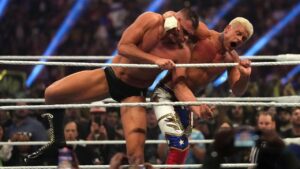When the conversation turns to the best women’s wrestlers of all time, one would be silly to leave out Aja Kong. One thing that has always gone under-reported about Kong is the fact that she is mixed-race, which makes her accomplishments even more impressive in hindsight. Her father was an African-American soldier, while her mother was Japanese. To this day mixed-race individuals suffer racial discrimination in Japan, just look at stories from Hana Kimura‘s mother Kyoko of the abuse her daughter suffered. What Aja Kong had to overcome was similar discrimination that makes her story all the more fascinating.
Aja Kong: A Mixed-Race Legend
Aja Kong was raised by her single mother, a mother whose family had largely disowned her for her relationship with Kong’s father. Society often looked down on such broken families but Kong was also the only mixed-race child in her school. From a young age, Kong was an outcast, her classmates ignored her and when they did speak to her it was only in a derogatory manner.
At the young age of 16 Kong made her All Japan Women’s Pro Wrestling (AJW) debut as Erika Shishido, wrestling granted her a high and an escape from the years of bullying. But she was quickly brought back down to earth by AJW. Kong had requested to become a babyface as she wanted to be a hero, the company told her that she should be a villain because she’s “half” (i.e half-Japanese, a derogatory term used towards mixed-race individuals). Not only did the company not want her to be a babyface because of her identity, but they also nicknamed her “daughter of Kong” and we’ll just leave it to the imagination as to why that was. The name Aja Kong itself could be considered to have racial undertones but Kong herself claims it was inspired by her beating her chest like King Kong.
Her racial identity also formed the basis of her ring style. AJW wanted her to be full of hate for the Japanese people. A quote from Kong herself is that they told her “..you’re black so you should feel this hatred towards Japanese people and crush them…”. Kong didn’t really want to do this, she wanted to be a hero. At the time AJW had a monopoly on women’s wrestling in Japan and you had no choice but to do what they said or you’d be replaced. In the end, Kong decided to use this to her advantage, embracing the heel role and becoming one of the most vicious and monstrous competitors in AJW.
The rest, as they say, is history. Kong went on to become one of the biggest stars in AJW and the first Black WWWA World Champion since Sandy Parker in 1973. Kong’s popularity inevitably forced AJW to let her be a babyface who fans cheered, and to this day she is revered as a legend. Don’t get it twisted though this isn’t an inspirational story. Erika Shishido is an incredibly strong woman who had to roll with the punches to become a legend. Shishido faced discrimination as a child and as a wrestler and she had to make the most of both situations to succeed because no one was going to let her. She should be commended for accomplishing all she did in the face of discrimination but her tribulations should not become inspiration porn. We should never see a human face the kind of discrimination Shishido did, but we should applaud Aja Kong for turning such hardships into fame and happiness.






